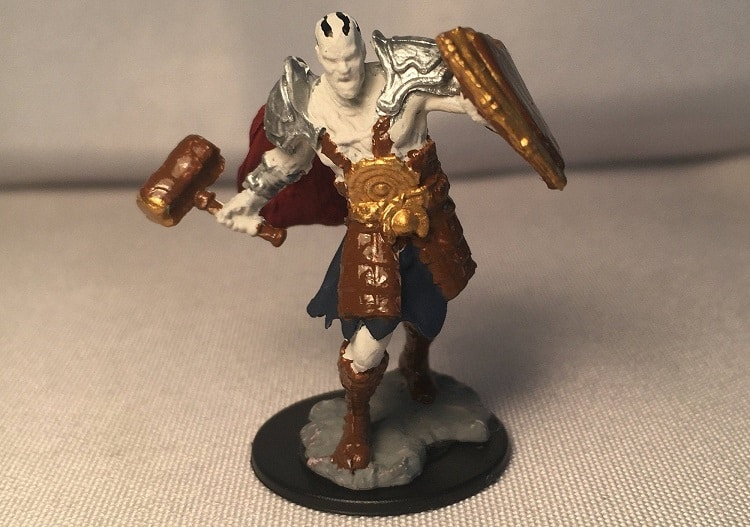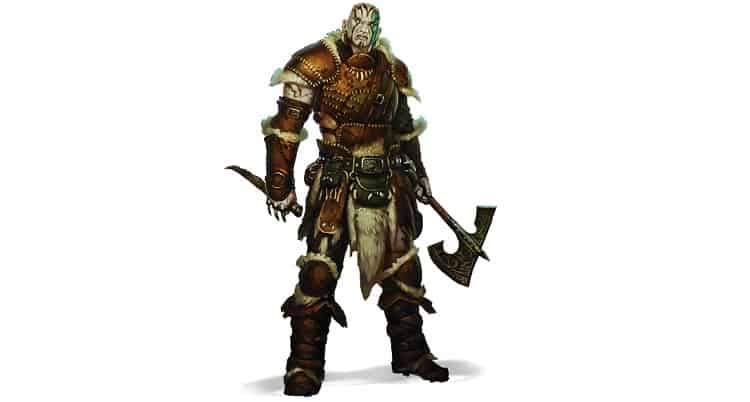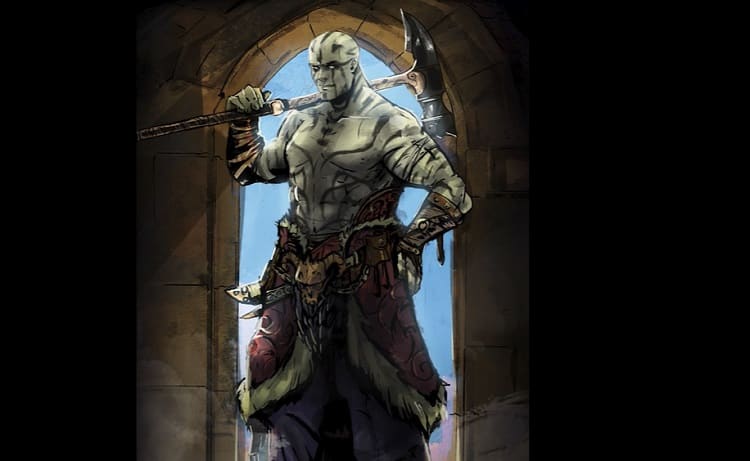It’s not just Dwarves, Elves, and Humans anymore. The D&D world has been populated with a large number of playable creatures, from drow to orcs, to everlong, you will be able to find the race of creature that fits your fancy. Of course, there are converted content and homebrew items as well, just in case you still don’t have an idea of what you need to do.
One of the newest races to grace the player’s options is the Goliath. This race is a mix between giant and human, and it is a pretty versatile class to play. However, before we can delve into its stats, it is important to figure out how to roleplay this race.
The Goliath Lore

Goliath are medium-sized humanoids who live in the cold mountains of Toril. They have hard stone-like skin and also have various patches of skin that would cover their bodies. The Goliaths believe that those markings could explain their fate or destiny, and they would never tattoo themselves as it would affect their future.
With needing to hunt for food, water, and shelter in the highest peaks of the Torii mountains, goliath’s main resource is its competitiveness. If each goliath doesn’t do its part to aid in the survival of the tribe, the tribe will die. Inversely, if the goliath does more than its part, the entire group will survive.
Only goliath’s main premium is self-sufficiency and individual skill, and they tend to keep score and treat everything as a competition. They don’t mean this in a bad way, but rather as a way to improve the skills of the whole group.
For them, having fair competition means that the most important aspects are talent, dedication, and effort. Rather than relying on various advantages and disadvantages that can be lost as the terrain changes, they choose to rely on themselves.
They also try to outdo themselves in both their exploits in battle and their feats while working. If a goliath manages to slay a dragon, that same goliath will then spend his entire life hunting an even bigger dragon to slay. There aren’t too many elderly goliaths, because most of them have fought and died at their physical prime.
Playing a Goliath

Goliaths are kind of like the Klingon race from Star Trek, where they value honor and strength above all else, even handicapping themselves to make sure that everyone has a fair playing field during competitions. While you don’t have to play your goliath according to the lore, you can, and it will certainly be interesting.
Goliaths have a few special abilities that will make them different from the other races in the party. Here are some of them, according to the Elemental Evil Player’s Compendium.
- Natural Athlete. You have proficiency in the Athletics skill.
- Stone’s Endurance. You can focus yourself to occasionally shrug off injury. When you take damage, you can use your reaction to roll a d12. Add your Constitution modifier to the number rolled, and reduce the damage by that total. After you use this trait, you can’t use it again until you finish a short or long rest.
- Powerful Build. You count as one size larger when determining your carrying capacity and the weight you can push, drag, or lift.
- Mountain Born. You have resistance to cold damage. You’re also acclimated to high altitude, including elevations above 20,000 feet.
So goliaths are pretty powerful and athletic creatures, with a strong desire for fairness, self-sufficiency, and personal accountability. This doesn’t ever stop them from working with others, but it prevents them from depending on others. At the end of the day a Goliath needs to be on their own.
The Stone’s Endurance perk can increase your survivability and can even turn a lethal blow into something less lethal, or even mitigating the damage entirely depending on your score. Powerful build allows a medium sized creature to lift, push, and drag the equivalent of a Large creature, which is pretty interesting.
Mountainborn can be perfect for those adventures in the mountains, and will allow you to shrug off cold damage. Resistance to any type of damage is always useful.
What Classes Should a Goliath Pick?

Of course, a six to seven foot tall giant that weighs 300 pounds and typically uses two handed weaponry brings certain classes to mind. They can carry a lot of gear as well, making them perfect for a fighter or barbarian roll where you can be a bit of a tank.
If you want your goliath to know magic, then being a paladin or cleric can help you have a few spells in their arsenal. Goliaths can mostly focus on defensive magic as well as magic that can help even up a fight.
As a cleric, you can either focus on boosting your wisdom to improve your complement of spells or sticking with the basic spells to improve your strength. This does fit with the lore of the Goliath, as they are creatures of self-sufficiency and will often train their natural abilities in case they lose their power.
Classes such as bards, druids, and wizards aren’t going to be the best for a goliath. They just don’t have the stats to cast spells reliably, as well as restrictions if they want to wear armor and use spells.
The Stone’s Endurance can really balance out the barbarian’s reckless attack. Reckless attack allows barbarian to forgo all defense in favor of attack. Attacking recklessly can give you advantage on your next attack, but all attacks against you have advantage until your next turn. Stone’s Endurance can allow you to defend against that damage.
It’s the perfect combat move, and can give you some options when raging out in battle. Fighters are also a good class for this as well, as are Paladins.
What’s in a Name?
Another interesting facet to creating your goliath character is that each one has three names. For example, they have their given name, the nickname, and their clan name. A goliath name could be Aukan Threadmaker Elanithino. You can talk to your DM about what clans your goliath could be affiliated with.
The nickname of a goliath can be changed, and often a great deed or notable failure in this goliath’s life. Often the tribal chief or elder will change nicknames, or sometimes friends of the Golitah will begin to give him a new nickname that catches on.
A great adventuring hook for a goliath might be one where they try to find or earn a new nickname for themselves.
Roleplaying a Goliath Effectively

If you want to play the goliath in the most friendly way, then you need to focus on self-sufficiency and fair play with yourself and your party. While you can trust your allies and fight as part of a team, you can’t depend on them forever. You know that no matter what, you need to be by yourself and fight your enemies on your own terms sometimes.
You also want to focus on the spirit of competition, as driving competition between yourself and your party members. You can encourage party members who are down or who are struggling with problems of their own to start becoming better, and they also focus on fair play when it comes to competition and combat.
For example, if a goliath manages to break his enemy’s weapon during combat, he will put away his own weapon and engage the now unarmed enemy with his fists. If the goliath is climbing in a race with the less experienced climber, then the character might put rocks in his backpack to give the less experienced one a fair chance.
Keep in mind though, goliath will only hobble himself in order to make the field fair and will not put himself at the disadvantage. The only reason they might handicap themselves is to improve the field, but they will still need to have a chance to win even with the disadvantage.
Focus on the Past
Another thing that goliaths focus on is one-upping themselves, as they believe it only makes them stronger. You can record your character’s deeds: Saving a town, slaying a giant, or getting a special weapon can be some options.
Then, your character wants to one up themselves. For example, if your goliath has saved a village from a dragon, then they will stop at nothing until they have saved a huge town. If they have slain a giant, then they will not rest until they have slain a bigger one.
For goliaths, stagnancy and competence is death up in the mountains, and the same goes with being part of an adventuring party. Your goliath is always going to push itself to be better and take on the next foot and climb the next hill, and once that is done it is going to push itself to do even more.
You can decide if your goliath becomes blinded with the need to succeed, and potentially becomes reckless with the need to face bigger foes at the expense of the party.
Goliath FAQ
Question: What are some Story Hooks for A Goliath?
Answer: If you have a solitary and tribe focused on goliath, you might find That It can be hard to see Them Their leaving home and joining the party of Several other different creatures.
Well, in goliath law if a goliath cheats or steals or acts dishonorably, then they are shunned or exiled. If you want an easy way to have your goliath join a group, then they could be shunned or have left their tribe to seek adventure in the wider world.
Another storyhook could see your Goliath joining the group to receive a nickname or to perform a good deed to distinguish themselves in the eyes of their tribe. These two story hooks are vague enough to work with any type of adventure, and allow for a lot of exploration by both the player and the DM.
Question: Are Goliath’s Too Reckless?
Answer: With the lore saying que the goliaths always seek to one up Themselves and que old age is something most goliaths See the enemy, it might be very easy to play your Goliath as a glory seeking warrior who cartoons into battle without thinking, but thinking the goliaths they are also loyal to their friends and allies, wanting to help them succeed.
Additionally, they will never charge into a battle they can not win. They will always try to keep it fair because their whole goal is winning the fight and getting some glory for themselves.
So their recklessness is tempered by their need to play fair and make sure they can win the combat. They also have a phrase that can also be a mantra for you as you build your character. ‘Today’s rival can be tomorrow’s teammate.’
If they are competitive, they won’t hold anything against their competition. Instead they want to make everyone better and also believe that their rivals are still their allies.
Question: Can a Goliath be Lawful Evil?
Answer: Goliaths are pretty lawful, and while lawful good and lawful neutral is pretty standard for a goliath, you might need to wonder about whether lawful evil can work for a goliath.
Well, lawful evil doesn’t mean that they are sociopaths, but rather that they respect law and order to an extreme degree, goliaths that are lawful evil can care about order and the rules, but they also care for themselves.
So these creatures will focus on gaining glory for themselves, and also gaining glory for their tribe while also making sure they are recognized for it.
They are generally unwilling to break the laws and also disregard individual freedoms, so they are very authoritarian. If you want a goliath that is very interested in following the rules and enforcing the spirit of competition and fair play at all costs, then you can have that. Other lawful alignments are also very easy to slip into if you decide to play them.
Final Thoughts
While goliaths are newer to D&D, they certainly play a useful role. The self-sufficiency and lawfulness of a goliath are what make them such a beneficial character to have. Are you looking for more information on other D&D characters? Check out the rest of our site to learn more!
- DnD Demons Guide: What Are Demons in 5e? - September 18, 2021
- Detect Thoughts 5e Guide: When, Why and How to Use It - September 9, 2021
- The Ultimate DnD Toll the Dead 5e Guide - September 9, 2021

